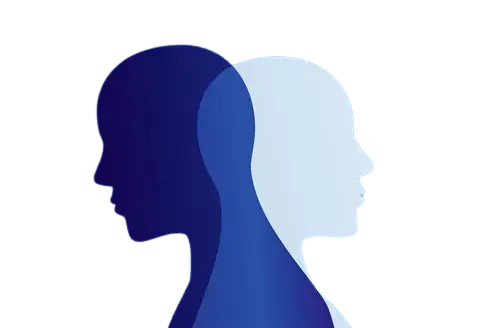Bipolar disorder Expert in Perumbakkam
Your Trusted Partner in Bipolar disorder
Bipolar disorder, formerly called manic depression, is a mental health condition that causes extreme mood swings that include emotional highs (mania or hypomania) and lows (depression). We are here to provide you with top-notch care and guidance to tackle your problems.

Understanding Bipolar disorder
Symptoms of Bipolar disorder
- Bipolar I disorder: You’ve had at least one manic episode that may be preceded or followed by hypomanic or major depressive episodes. In some cases, mania may trigger a break from reality (psychosis).
- Bipolar II disorder: You’ve had at least one major depressive episode and at least one hypomanic episode, but you’ve never had a manic episode.
- Cyclothymic disorder: You’ve had at least two years — or one year in children and teenagers — of many periods of hypomania symptoms and periods of depressive symptoms (though less severe than major depression).
- Other types: These include, for example, bipolar and related disorders induced by certain drugs or alcohol or due to a medical condition, such as Cushing’s disease, multiple sclerosis or stroke
Symptoms in children and teens
Symptoms of bipolar disorder can be difficult to identify in children and teens. It’s often hard to tell whether these are normal ups and downs, the results of stress or trauma, or signs of a mental health problem other than bipolar disorder.
Children and teens may have distinct major depressive or manic or hypomanic episodes, but the pattern can vary from that of adults with bipolar disorder. And moods can rapidly shift during episodes. Some children may have periods without mood symptoms between episodes.
The most prominent signs of bipolar disorder in children and teenagers may include severe mood swings that are different from their usual mood swings.
Causes
The exact cause of bipolar disorder is unknown, but several factors may be involved, such as:
- Biological differences: People with bipolar disorder appear to have physical changes in their brains. The significance of these changes is still uncertain but may eventually help pinpoint causes.
- Genetics: Bipolar disorder is more common in people who have a first-degree relative, such as a sibling or parent, with the condition. Researchers are trying to find genes that may be involved in causing bipolar disorder.
Risk factors
Factors that may increase the risk of developing bipolar disorder or act as a trigger for the first episode include:
- Having a first-degree relative, such as a parent or sibling, with bipolar disorder
- Periods of high stress, such as the death of a loved one or other traumatic event
- Drug or alcohol abuse
Complications
Left untreated, bipolar disorder can result in serious problems that affect every area of your life, such as:
- Problems related to drug and alcohol use
- Suicide or suicide attempts
- Legal or financial problems
- Damaged relationships
- Poor work or school performance
Prevention
There’s no sure way to prevent bipolar disorder. However, getting treatment at the earliest sign of a mental health disorder can help prevent bipolar disorder or other mental health conditions from worsening.
If you’ve been diagnosed with bipolar disorder, some strategies can help prevent minor symptoms from becoming full-blown episodes of mania or depression:
- Pay attention to warning signs: Addressing symptoms early on can prevent episodes from getting worse. You may have identified a pattern to your bipolar episodes and what triggers them. Call your doctor if you feel you’re falling into an episode of depression or mania. Involve family members or friends in watching for warning signs.
- Avoid drugs and alcohol: Using alcohol or recreational drugs can worsen your symptoms and make them more likely to come back.
- Take your medications exactly as directed: You may be tempted to stop treatment — but don’t. Stopping your medication or reducing your dose on your own may cause withdrawal effects or your symptoms may worsen or return.
Frequently Asked Question on Bipolar disorder
Bipolar disorder, formerly known as manic-depressive illness, is a mental health condition characterized by extreme mood swings, including episodes of mania (elevated mood, increased energy) and depressive episodes (sadness, low energy).
There are several types of bipolar disorder, including Bipolar I disorder (manic episodes with or without depressive episodes), Bipolar II disorder (hypomanic episodes and depressive episodes), cyclothymic disorder (chronic mood disturbances not meeting the criteria for mania or depression), and others.
Diagnosis is typically made by a mental health professional based on a comprehensive assessment, including a detailed history of mood symptoms, observation of behavior, and ruling out other possible causes.
Bipolar disorder is a chronic condition that often requires ongoing management. With proper treatment and support, individuals with bipolar disorder can lead fulfilling lives.
Yes, bipolar disorder is treatable. Treatment typically involves mood-stabilizing medications, psychotherapy (counseling), and lifestyle management. Support from family and friends is also crucial.
Yes, children and adolescents can develop bipolar disorder, although it may present differently than in adults. It’s essential to seek professional evaluation if there are concerns about a child’s mood and behavior.
Medication is often a key component of bipolar disorder treatment, particularly for mood stabilization. However, lifestyle changes, therapy, and a supportive environment also play important roles in managing the condition.
